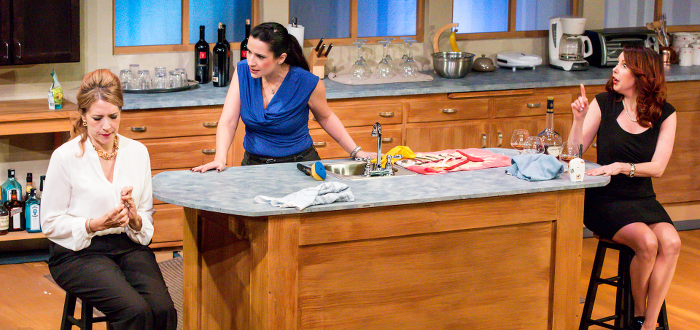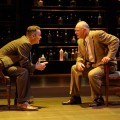A polar vortex of a different kind has swept into town with City Lights Theater’s first play of the year, Michele Lowe’s The Smell of the Kill. A play with such fast-paced energy and dialogue is well suited for an intimate space like City Lights Theater.
The dark comedy, which focuses on three women who face a choice that’s tougher than one might initially expect, is narrated by actors—never seen onstage—playing the trio’s husbands.
The Smell of the Kill opens with a dinner party. It’s a monthly chore for the wives, who all dislike each other, that’s organized by their husbands, who are all buddies. Debra (Diahanna Davidson), is an ex-appraiser with an adulterous husband who maintains her denial through sardonic and biting comments. Nikki (Mandy Ames), is the owner of the house. She is at wit’s end because her husband is in deep trouble with the law. And Molly (Morgan Voellger), a woman utterly controlled by her husband, plays the ditz to the others’ comedic disillusionment, sprinkling her naïveté with great one-liners.
One by one, the wives’ grievances are revealed. Through frenetic and hilarious dialogue, it becomes clear that the woman are living equally unfortunate lives. Molly is clearly obsessed with Nikki’s child, the baby she can never have. Debra is resentful of Nikki for putting her career before her child, while begrudgingly accepting her life for what it is. Meanwhile, the immature, indignant husbands, reduced to offstage voices, constantly yell, horse around and vie for the attention of the three wives, although they are mostly ignored.
Soon, however, the men will be the center of attention, whether they know it or not. Nikki’s husband, Jay, the alleged criminal, has installed a meat-locker in the basement of the house, a room in which the husbands quickly manage to lock themselves. After listening to their knocks for help, Nikki gets a truly malicious idea: why not use this opportunity to kill their husbands and stage it as an accident? She sets out to convince the other women, justifying the killing as the proper response to their spouses’ brutishness.
Molly, under husband Danny’s thumb, is quickly convinced. She and Nikki resort to force to win Debra over—or at least stop her from foiling their plan.
Chaos builds, but the humor stays crisp and clear. The actors do a superb job of playing it tense and keenly aware of their own burdens, mixing slapstick and quick conversation with leitmotif of murder. The dialogue is also surprisingly dirty—which adds to the fun—and the crassness is equal to the charisma. Best of all, the denouement of the play, despite the chaos before, is both realistic and satisfying

 Review: Japanese Curry? Find It at Muracci’s Japanese Curry & Grill
Review: Japanese Curry? Find It at Muracci’s Japanese Curry & Grill  Preview: San Jose Beerwalk Takes Over Japantown
Preview: San Jose Beerwalk Takes Over Japantown 


